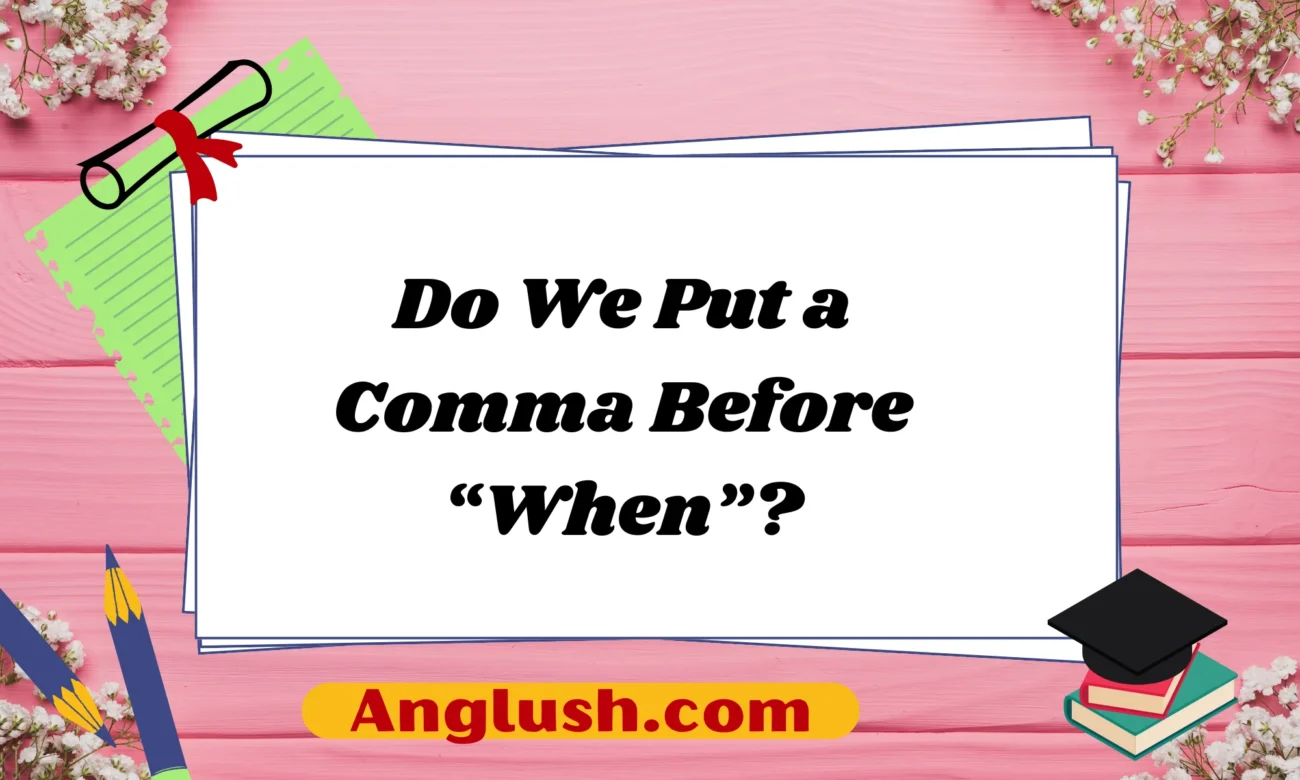The English language is full of small but significant rules that affect clarity and meaning. One common question that often arises is whether to place a comma before the word “when.” The answer depends on the structure of the sentence and how “when” is used.
In this article, we will explore the different grammatical scenarios where “when” appears, provide clear guidelines for using a comma, and include plenty of examples. By the end, you will understand the nuances of comma placement and be able to write with confidence.
1. Understanding “When” in a Sentence
“When” can function as different parts of speech in English. The most common uses include:
- As a subordinating conjunction (introducing dependent clauses)
- As an adverb (modifying a verb)
- As an interrogative word (used in questions)
Each of these uses affects whether a comma is needed before “when.” Let’s examine them in detail.
2. When “When” is a Subordinating Conjunction
A subordinating conjunction introduces a dependent clause—a part of the sentence that cannot stand alone.
No Comma When “When” Follows the Main Clause
When the dependent clause comes after the main clause, no comma is needed.
✅ Examples:
- I was reading a book when the phone rang.
- She smiled when she saw her best friend.
- They will call you when they arrive.
In these examples, “when” introduces the dependent clause at the end, and no comma is required.
Comma Needed When the “When” Clause Comes First
If the sentence begins with “when”, a comma is needed to separate the dependent clause from the main clause.
✅ Examples:
- When the sun sets, the sky turns orange.
- When she entered the room, everyone applauded.
- When I finished my work, I took a long break.
Here, the comma helps signal the transition from the introductory “when” clause to the main clause.
3. When “When” is an Adverb
“When” can also function as an adverb that modifies a verb, similar to “then” or “soon.” In this case, no comma is typically needed.
✅ Examples:
- I’ll tell you when I’m ready.
- Do you remember when we first met?
- He didn’t know when to stop.
In these sentences, “when” acts as an adverb providing additional information about the verb. No comma is needed.
4. When “When” is an Interrogative Word
“When” is often used to ask questions. In this case, there is no need for a comma before “when.”
✅ Examples:
- Do you know when the meeting starts?
- Can you tell me when your flight arrives?
- She asked when we would leave.
Since these are direct or indirect questions, commas are unnecessary.
5. When to Use a Comma Before “When” in Special Cases
There are a few exceptions where a comma may be needed before “when.
When “When” is Used in Parenthetical Phrases
If “when” introduces extra information that is not essential to the main sentence, use a comma.
✅ Examples:
- The event, when properly organized, can attract thousands of visitors.
- The summer festival, when held in the city center, brings in large crowds.
Here, the “when” phrase acts as an interruption and should be set off by commas.
When “When” is Used in Appositive Phrases
If “when” introduces an explanatory phrase, use a comma.
✅ Examples:
- My birthday, when I always have a big party, is in July.
- That day, when we first met, changed my life.
Since the “when” phrase is additional information, commas are necessary.
6. Summary: Quick Rules for Using a Comma Before “When”
| Sentence Structure | Comma Needed? | Example |
| Main clause + “when” clause | ❌ No | I was happy when I saw her. |
| “When” clause + main clause | ✅ Yes | When I saw her, I was happy. |
| “When” as an adverb | ❌ No | I don’t know when it happened. |
| “When” in a parenthetical phrase | ✅ Yes | The concert, when held outdoors, is amazing. |
| “When” in an appositive phrase | ✅ Yes | My birthday, when I turn 30, is next month. |
7. 10 Texting Examples for Everyday Use
Here are some user-friendly texting examples that illustrate when a comma should or shouldn’t be used before “when.”
No Comma Needed
- Let me know when you’re free.
- I’ll text you when I get home.
- She always laughs when I tell a joke.
- You’ll understand when you get older.
- Call me when you land at the airport.
Comma Needed
- When you have time, let’s grab coffee.
- When the meeting is over, I’ll call you.
- The best time to visit, when the weather is nice, is spring.
- My favorite moment, when we all laughed, was unforgettable.
- That trip, when we got lost, was hilarious!
These examples demonstrate real-life applications of the rule in a way that’s easy to understand.
8. Final Thoughts
The placement of a comma before “when” depends on sentence structure. In general:
- If “when” introduces a dependent clause after the main clause, no comma is needed.
- If “when” starts a sentence, a comma is necessary.
- If “when” appears in a parenthetical phrase or an appositive phrase, commas are required.
By following these guidelines, you can improve the clarity and correctness of your writing. Keep practicing, and soon, comma placement will become second nature.

